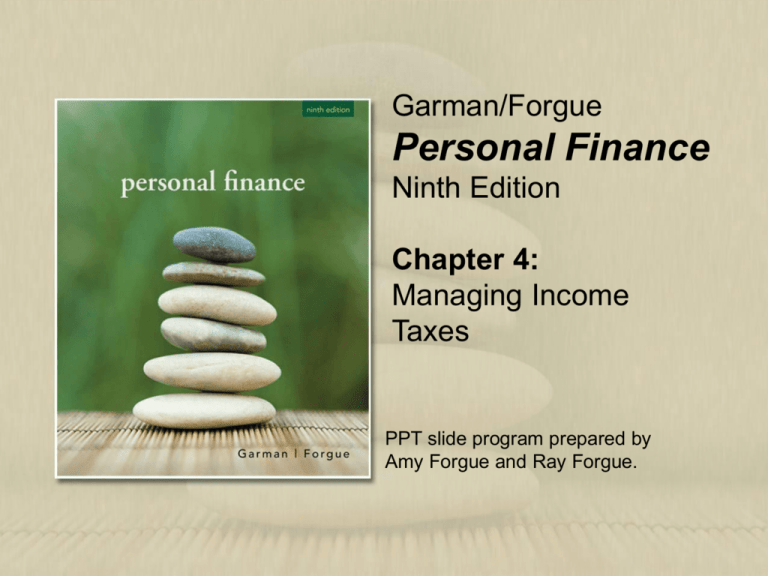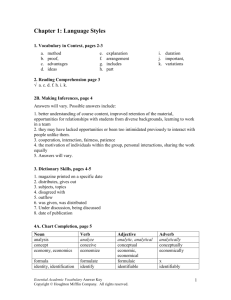
Garman/Forgue
Personal Finance
Ninth Edition
Chapter 4:
Managing Income
Taxes
PPT slide program prepared by
Amy Forgue and Ray Forgue.
Learning Objectives
1. Explain the nature of progressive income
taxes and the marginal tax rate.
2. Differentiate among the eight steps
involved in calculating your federal income
taxes.
3. Use appropriate strategies to avoid
overpayment of income taxes.
Copyright ©Houghton Mifflin Company. All rights reserved.
4-2
Introduction
• Tax Planning: Seeking legal ways to
reduce, eliminate, or defer income
taxes.
• Taxable Income: the income upon
which income taxes are levied.
Copyright ©Houghton Mifflin Company. All rights reserved.
4-3
Taxes
• Progressive income taxes and the marginal
tax rate
– Taxes
– Internal Revenue Service (or IRS)
– Internal Revenue Code
• The progressive nature of the federal income
tax
– Progressive tax
– Regressive tax
Copyright ©Houghton Mifflin Company. All rights reserved.
4-4
The Marginal Tax Rate
• Marginal tax bracket (or MTB)
• Marginal tax rate
• Indexing
Copyright ©Houghton Mifflin Company. All rights reserved.
4-5
Marginal Tax Rate and Financial
Decisions
• Your effective marginal tax rate is
probably 43%.
• Your average tax rate is lower.
– Average tax rate: Proportion of total
income paid in income taxes.
Copyright ©Houghton Mifflin Company. All rights reserved.
4-6
8 Steps in Calculating
Your Income Taxes
1. Determine your total income.
2. Determine and report gross income after
subtracting exclusions.
3. Subtract adjustments to income.
4. Subtract either the IRS’s Standard
Deduction for your tax status or itemize your
deductions.
Copyright ©Houghton Mifflin Company. All rights reserved.
4-7
8 Steps in Calculating Your Income
Taxes
5. Subtract the value of your personal
exemptions.
6. Determine your preliminary tax liability.
7. Subtract tax credits for which you qualify.
8. Calculate the balance due the IRS or the
amount of your refund.
Copyright ©Houghton Mifflin Company. All rights reserved.
4-8
Total Income
• Total Income: Compensation from all
sources.
Copyright ©Houghton Mifflin Company. All rights reserved.
4-9
Total Income
• Income to include:
– Wages and Salaries
– Commissions
– Tips Earned
– Gambling and Lottery Winnings
• Include capital gains and losses in
Total Income.
– Long-term gain (or loss)
Copyright ©Houghton Mifflin Company. All rights reserved.
4 - 10
Gross Income
• Determine and report your gross
income after subtracting exclusions.
Copyright ©Houghton Mifflin Company. All rights reserved.
4 - 11
Gross Income
• Income to exclude:
– Gifts
– Inherited money or property
– Income from a carpool
– Federal income tax refunds
Copyright ©Houghton Mifflin Company. All rights reserved.
4 - 12
Gross Income
• More income to exclude:
– Employee contributions to flexible
spending accounts
– Reimbursements from flexible spending
accounts
– Child support payments received
Copyright ©Houghton Mifflin Company. All rights reserved.
4 - 13
Subtract Adjustments to Income
• Adjustments to Income
• Adjusted Gross Income (or AGI)
Copyright ©Houghton Mifflin Company. All rights reserved.
4 - 14
Deductions
• Subtract either the IRS’s standard
deduction for your tax status or your
itemized deductions.
• Standard deduction depends on filing
status.
– $5350 for single individuals
– $10,700 for married couples
Copyright ©Houghton Mifflin Company. All rights reserved.
4 - 15
Deductions
• Itemized deductions: Medical and
dental expenses
Copyright ©Houghton Mifflin Company. All rights reserved.
4 - 16
Deductions
• Itemized deductions: Taxes you paid
– Real Estate Property Taxes (home or land)
– Personal Property Taxes
– State, Local, and Foreign Income Taxes
– State and Local Sales Taxes (instead of
state and local income taxes)
Copyright ©Houghton Mifflin Company. All rights reserved.
4 - 17
Deductions
• Itemized deductions: Taxes you paid
– Interest Paid on Home Mortgage Loans
– “Points”
– Interest Paid on Home-Equity Loans
Copyright ©Houghton Mifflin Company. All rights reserved.
4 - 18
Deductions
• Itemized deductions: Interest you paid
– Interest paid on loans used for investments
– Mortgage insurance premiums on new
loans after January 1, 2007
Copyright ©Houghton Mifflin Company. All rights reserved.
4 - 19
Deductions
• More itemized deductions:
– Gifts to charity
– Casualty and theft losses
Copyright ©Houghton Mifflin Company. All rights reserved.
4 - 20
Deductions
• Miscellaneous deductions in excess of
2% of adjusted gross income
• Other miscellaneous deductions allowed
at 100%:
– Gambling losses
– Business expenses for workers with
disabilities
Copyright ©Houghton Mifflin Company. All rights reserved.
4 - 21
Exemptions
• Exemption (or Personal Exemption)
• Subtract the value of your personal
exemptions.
• Each exemption reduces taxable
income by $3400.
Copyright ©Houghton Mifflin Company. All rights reserved.
4 - 22
Exemptions
• Claiming another person as an
exemption
• What if you are claimed as an
exemption?
– If someone else claims you, you cannot
claim yourself.
– The opposite is also true.
Copyright ©Houghton Mifflin Company. All rights reserved.
4 - 23
Tax Liability
• Determine your preliminary tax liability.
• Subtract tax credits for which you
qualify.
– Tax Credit: Dollar-for-dollar decrease in
tax liability.
Copyright ©Houghton Mifflin Company. All rights reserved.
4 - 24
Tax Credits
• Hope Scholarship Credit
• Lifetime Learning Credit
• Earned Income Credit
• Child Tax Credit
• Child and Dependent Care Credit
• Retirement Savings Contribution Credit
Copyright ©Houghton Mifflin Company. All rights reserved.
4 - 25
Tax Liability
• Calculate the balance due the IRS or
the amount of your refund.
Copyright ©Houghton Mifflin Company. All rights reserved.
4 - 26
Avoid Taxes Through Proper Planning
• Practice legal tax avoidance, not tax
evasion.
Copyright ©Houghton Mifflin Company. All rights reserved.
4 - 27
Avoid Taxes Through Proper Planning
• A dollar saved from taxes is really two dollars
- or more.
• Opportunity cost
• Earning another dollar to replace one given to
the IRS
• Earnings on a dollar not given to the IRS
Copyright ©Houghton Mifflin Company. All rights reserved.
4 - 28
Reduce Taxable Income Via Your
Employer
• Premium only plan
• Transportation reimbursement plan
Copyright ©Houghton Mifflin Company. All rights reserved.
4 - 29
Dependent Care Flexible Spending
Account
• Flexible Spending Account (or FSA or
Expense Reimbursement Account)
Copyright ©Houghton Mifflin Company. All rights reserved.
4 - 30
Defined-Contribution Retirement Plan
• Defined Contribution Retirement Plan
– 401(k) Retirement Plan
• Matching Contributions
Copyright ©Houghton Mifflin Company. All rights reserved.
4 - 31
Make Tax-Sheltered Investments.
• Tax-Sheltered Investments:
Investments that yield returns that are
tax advantaged.
Copyright ©Houghton Mifflin Company. All rights reserved.
4 - 32
Reducing Taxable Income:
Other Strategies
• Investing with pretax income
• Tax-deferred investment growth
• IRA
• Roth IRA
Copyright ©Houghton Mifflin Company. All rights reserved.
4 - 33
Reducing Taxable Income:
Other Strategies
• Coverdell Education Savings Account
• Qualified Tuition (Section 529)
programs
• Govt. savings bonds
• Municipal bonds
Copyright ©Houghton Mifflin Company. All rights reserved.
4 - 34
Reducing Taxable Income:
Other Strategies
• Postpone income.
• Bunch deductions.
• Take all of your legal tax deductions.
Copyright ©Houghton Mifflin Company. All rights reserved.
4 - 35
Top 3 Financial Missteps in Managing
Income Taxes
People slip up in building and maintaining
good credit when they do the following:
1. Turn all you income tax planning over to
someone else.
2. Overwithhold too much income to receive a
refund next year.
3. Ignore the impact of income taxes in you
personal financial planning.
Copyright ©Houghton Mifflin Company. All rights reserved.
4 - 36
Good Money Habits in Managing
Income Taxes
•
Reduce you income taxes by signing
up for tax-advantaged employee
benefits at your workplace.
•
Contribute to you employer-sponsored
401(k) retirement plan at least up to
the amount of the employer’s
matching contribution.
Copyright ©Houghton Mifflin Company. All rights reserved.
4 - 37
Good Money Habits in Managing
Income Taxes
• Buy a home to reduce income taxes.
• Do your own tax return so you can
learn how to reduce your income tax
liability.
• Maintain good tax records.
Copyright ©Houghton Mifflin Company. All rights reserved.
4 - 38

